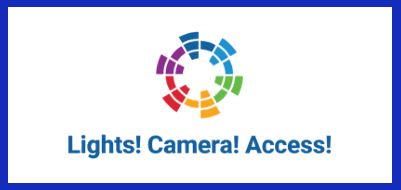Date:
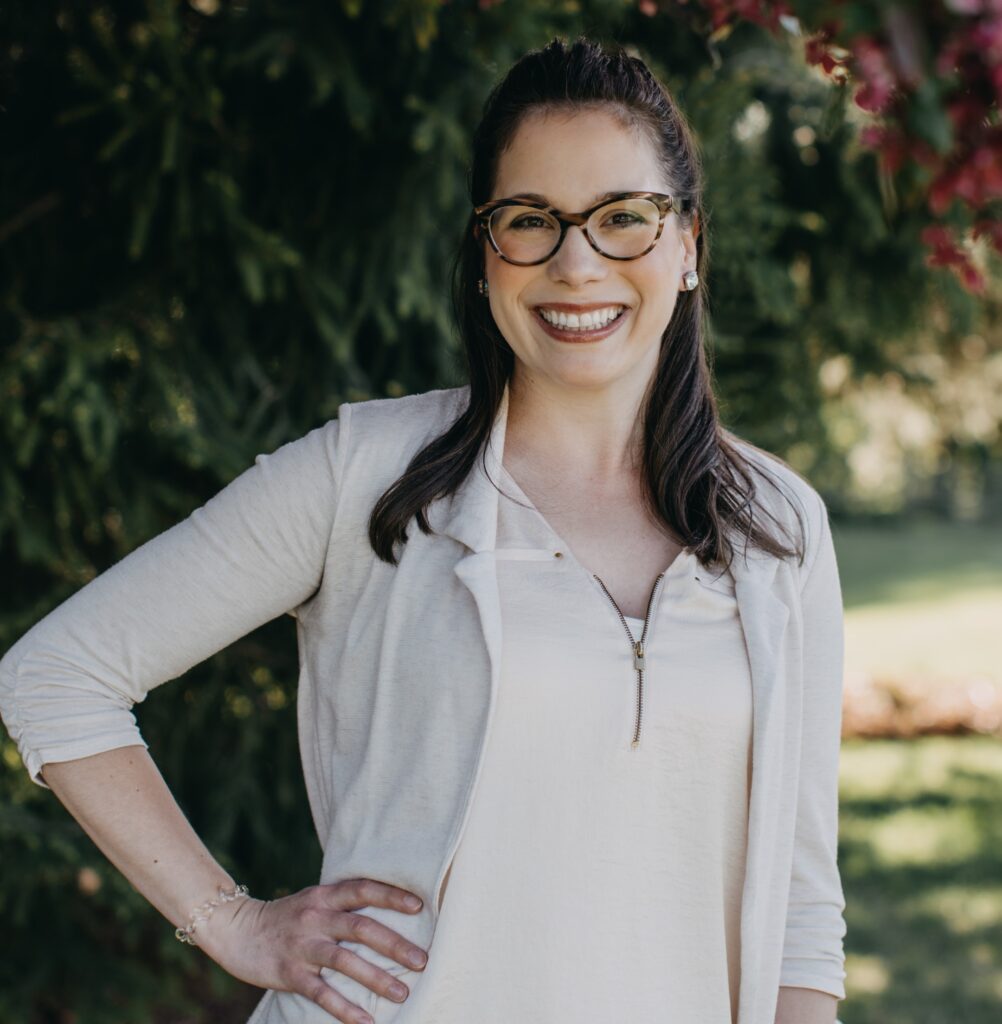
[Image Description: A Caucasian woman (Laura Anders) stands in front of foliage, dressed in a blouse, jacket, eyeglasses, jewelry, and with her hair pulled back.]
Hello, Laura. Welcome to the Light. Camera. Access. (LCA) Newsletter and
Marketing Team interview. Who is Laura Andert and how did your journey begin in the
disability community?
My name is Laura Andert, and I was born with cerebral palsy. I am 33 years old. I knew it
was ultimately up to me to create the future I wanted. I knew full well I could do this. I
could communicate and move independently in going after what I needed. I started
using perseverance and self-advocacy skills. My doctors and nurses told my parents I
could have difficulty in life. It wasn’t until last year that my parents told me this
information. I thought I wouldn’t have my fate dictated to me. Just watch me because
nothing will stop me from what I want for myself.
I discovered my passion using determination and self-advocacy. I knew one day I would
help individuals like me in the disability community accomplish their goals and dreams. I
am very grateful to do this in my professional life. If it wasn’t for my self-determination
and speaking up, my life would look completely different. Family, friends, and peers
continue praising me for my accomplishments. I respond by saying, “I’m not lucky.
I fought for my future. You are the creator of your future. No one else will do it for you.”
Can you share your career, education, or advocacy involvement?
I decided not to attend college after high school. Instead, I entered the workforce, and every job I set my sights on, I got. I persevered and advocated around obstacles and challenges in receiving those jobs.
I started as a restaurant Greeter/Hostess. Then I worked in Hospitality at two different gym facilities. Next, I worked in guest services at events like football games and concerts. I also worked as an Operations Assistant at an accessibility corporate company. All these jobs were stepping stones that led me to my career today.
I got my dream job at Inclusive Networking which teaches employers how to become
more inclusive in hiring individuals with disabilities. We support job seekers in finding
integrated and competitive employment. We use a customized employment approach to
make tailored positions based on the skills and talents individuals have. Specifically, as
a Disability Consultant, I inform, train, and provide education on hiring diverse
individuals with disabilities.
Another part of my job is as a certified Work Incentive Practitioner. I obtained my WIP-C
certification through The Work Incentive Support Center (WISC) at The K. Lisa Yang
and Hock E. Tan Institute on Employment and Disability, part of the ILR School at
Cornell University. I assisted individuals with Social Security benefits and provided work
incentive counseling services and support, by seeking to promote work preparation and
advancement. I focus on strengthening individuals’ self-sufficiency by reaching independence in receiving Social Security, Federal, and State benefits. I strive to help individuals realize they can take control of their financial futures with a strong emphasis on increasing financial well-being.
What are your hopes, goals, and expectations for yourself?
I want to continue to show up for myself. I must do this to support the ambitious future I
am creating. Among all the successes I have achieved, there have been days I just
wanted to throw in the towel, give up, and feel sorry for myself. However, I am having
less and less of these days because I am stronger at rising above my obstacles and
challenges. They only enhance my perseverance and self-advocacy. I want to continue
to prosper in my career. I want to be the best Work Incentive Practitioner possible. My
goal is to teach them how to manage their benefits efficiently, ultimately leading them to
the point where my services are no longer necessary.
Aside from my career, I desire to work as a model in the fashion and beauty industry. I
want to display disability representation. It is important to be comfortable in your skin,
especially when you hit 30.
What motivated you to become passionate about your career field and what was
your entrance strategy?
After seeing the results of my perseverance and self-advocacy, I had the desire to teach
other people with disabilities do the same thing. I wanted to show what it means to go
above and beyond when chasing what you want. Whether it is teaching independent
individuals and others who need more support, I want them to realize when they run into
closed doors there are other ways to open them.
We all have a voice. We must speak up for what we need and want. If we don’t, we may
not get the results. If we don’t speak up, some doors will not automatically open for us.
From my experience, when doors were shut because of my CP, I pushed forward to
figure out ways to make my dreams happen. You must keep a positive attitude, trust,
and believe that closed doors will open.
Can you discuss your achievements, where they’ve been showcased, and how others
can leverage their talents in any industry?
Every job I set my sights on I got. I am proud of myself because I did whatever it took to
receive those positions. I had amazing support from my family and job placement
specialists and job coaches even today. However, I always chose to be front and center because I was fully capable of speaking up. During the application process, I took the initiative and didn’t wait to see what would happen. I would politely follow up on my applications by calling and emailing the company’s point person. I continued this practice to see when my applications would be reviewed. Sometimes, I even traveled to the companies and showed up in person, expressing my deep interest.
I’ve been honored to be a guest on interviews and podcasts, sharing my journey in
navigating the world with CP. I hope that as people continue to visit and follow my page,
they will gain leverage by being persistent and speaking up. Following my example,
they will get closer to where they want and feel empowered.
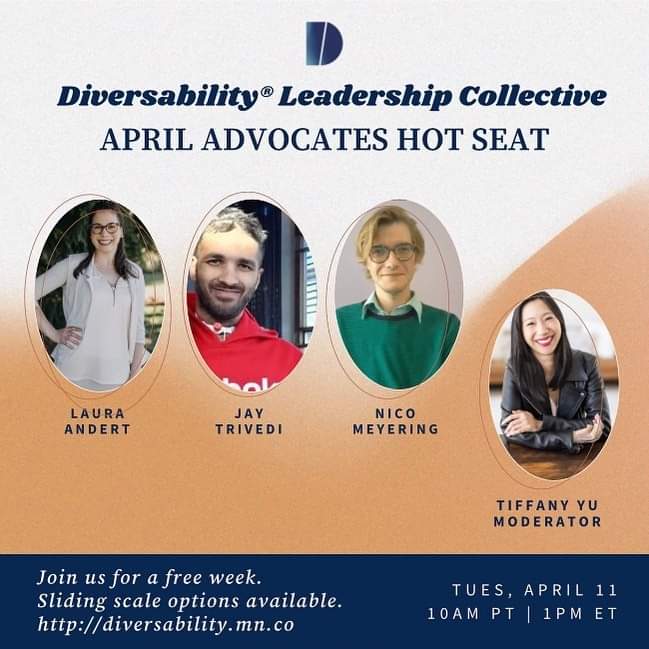
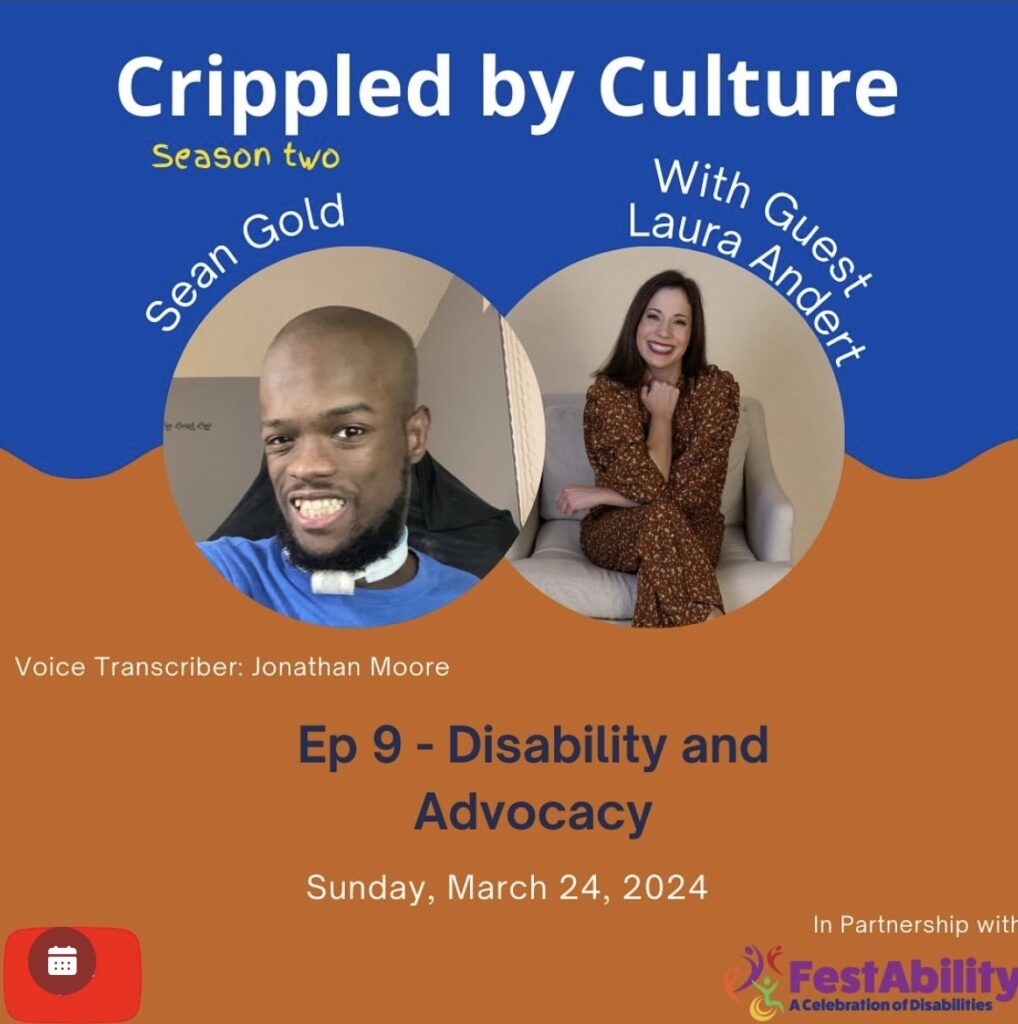
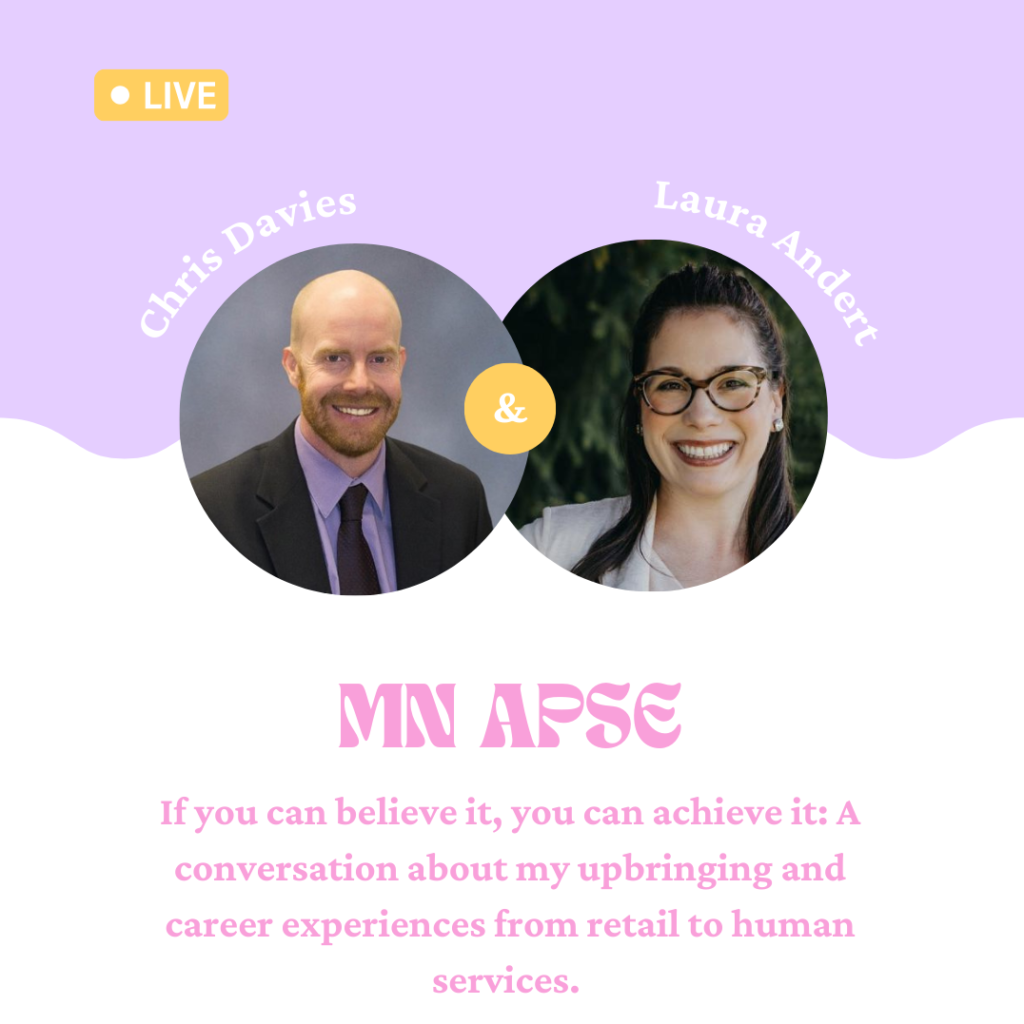
[Image Description: Various images display Laura’s podcasts with guests.]
What are the challenges you’ve faced with your disabilities in your career field?
I’ve heard when you enter your 30s, these are the best years of your life. I thought I had experienced some of this professionally. But I was wrong. This may sound odd,
although I’ve gotten to where I am today, when I hit my 30s it was as if everything
exploded. However, this was before my career began with inclusive networking.
There were self-doubting beliefs brushed under the rug that required addressing. I
needed to erase them. They were false beliefs, such as “What if I’m not good enough in
my next position? What if a position was out there and I missed out? What if I must go
back to work at one of my previous employers? Do I just settle for a job I do not want?” I
began a new chapter in my life by crushing those false beliefs one by one and
rediscovering how to be comfortable in my skin. This exercise was crucial because I’d
be holding myself back from my full potential. When I did this, inclusive networking
came to me. Thus, I knew I was ready for the next career step.
I was always open with my employers and co-workers that I had CP. I told them in my
interviews and spoke up about any accommodations. As a result, I have had no
experience with ableist comments or microaggressions. If customers, members, guests,
or clients were frustrated with me because of my CP, I reversed the psychology and
share having CP sometimes gets in the way.
What is your exit strategy if there are significant changes in your career field?
If there are significant changes in my career field, part of my exit plan is to have an
updated resume ready to go. Through my intense journey of becoming comfortable in
my skin, I learned every position that ran its course was a signal I had to move forward.
So, if my position ends, I’ll have an inner knowing that it’s time to leave.
How have your faith and/or spiritual practices helped advance your career choices?
Throughout my journey, I always kept a positive attitude no matter what was happening.
Yes, I cried when times were tough and felt like there was no way out. My positive attitude has empowered me to overcome anything that gets in my way. I now know how to center myself when obstacles and challenges present themselves. I breathe and tell myself everything is and will be ok. I believe there is a lesson when things don’t go according to my plan. My resilience to avoid becoming resistant because of the many career changes has improved immensely. I have erased those false beliefs and replaced them with true ones. If you don’t have this mentality of where you’re at in your career path, please learn it now. It all starts by turning inward and in believing who you truly are, and who you want to become. Don’t be afraid to take those steps.
Is there anything you would like to share with us about your experiences with
ableism and what practices did you implement navigating through ableist culture?
I have experienced ableism numerous times. We all know the unkind, ugly, and nasty comments hurt us. Here is one example that stands out to me. I am unable to drive, and I take a paratransit transportation service called Metro Mobility. One ordinary day, I got dropped off at my destination and when I entered the building, a receptionist asked me “Why did I take the bus instead of driving?” I said, “I was unable to drive due to my disability.” He responded by asking multiple ablest questions. He was rude. What I have done over the years is voice my limitations right away. I think if I do so, other people will not make rude comments. Sometimes though, I don’t feel the need to talk about my limitations, which results in receiving dirty looks when doing something differently. Moving forward, I put my best foot forward and show the public who I am and what assistance I need. This goes without saying, I am continuing to be committed to advocating with my fellow friends and peers to diminish ableism in our communities.
Is there anyone you consider to be your mentor and what makes them so
important in your life?
In 2018, when I was working at a gym, I was talking to one of my co-workers about life
in general and felt in my heart to ask her advice on something. It was a total meant-to-
be-moment because suddenly, she said she had it in her heart to refer me to her long-time mentor, Angela. A few days later, I contacted Angela. Since then, Angela has been my life coach and mentor. She has been there for me through it all. She taught me how to rediscover myself and what I wanted. She guided me on the steps to take when opportunities present themselves. Angela is an amazing human being and is blessed to have the gift of helping so many other women.
In what ways can the media industry revitalize the perception of people in the
disability community?
Today’s media includes people with disabilities, compared to years ago. Still, there is a long way to go in way to go in getting the media to be equal. One way the media should revitalize the
perception of including people with disabilities is to educate themselves. They should unlearn all their presumed perceptions about disability. They should know the word “disability” is not bad. Media professionals can do this by not just googling related topics, but by going on social media and looking up influencers in the disabled community. Disability influencers are the best teachers because of their life experiences. This is why disability advocacy is getting stronger every day.
Next, media professionals should ask themselves the following questions: How can we
include people with disabilities in our line of work? How do we hire them to be models
and feature them in our programs? Media professionals need to incorporate what they
learned, then apply and customize their processes to remove barriers. This will lead
to support the mission of improving disability inclusion.
To ensure rights for everyone in the U.S. and globally, what advice can you offer
about preserving rights (disability accessibility, employment, etc.) and joining forces to
dismantle these new laws that have been a threat worldwide?
I state again, that persevering and advocating for oneself is important for people with
disabilities because people are their best advocates to fight for what they need and
want. Oprah Winfrey once said, “You get in life what you have the courage to ask for.”
People must not give up.
People must dismantle barriers to disability accessibility, employment, and their communities. They must speak up for work accommodations. Authority figures will listen if we speak from the heart. The more this is done, the more equal rights will be gained.
If you were to advise people about finding their authentic selves within the disability
community, or wondering how to become an ally, what would you say to them?
I would tell them to find out what disability topics speak to them. They should ask
themselves the following questions: What do I want the disability community to learn
from me? What topics am I an expert on? What do I believe needs more or less
addressing?
I would advise them to dig deep into those passionate topics and let them come naturally.
Don’t hold back or be afraid. Once this is done, figure out how you would like to address
these topics. I would encourage them to visualize themselves advocating for justice on
these topics. Then, research and find ways to be an ally.
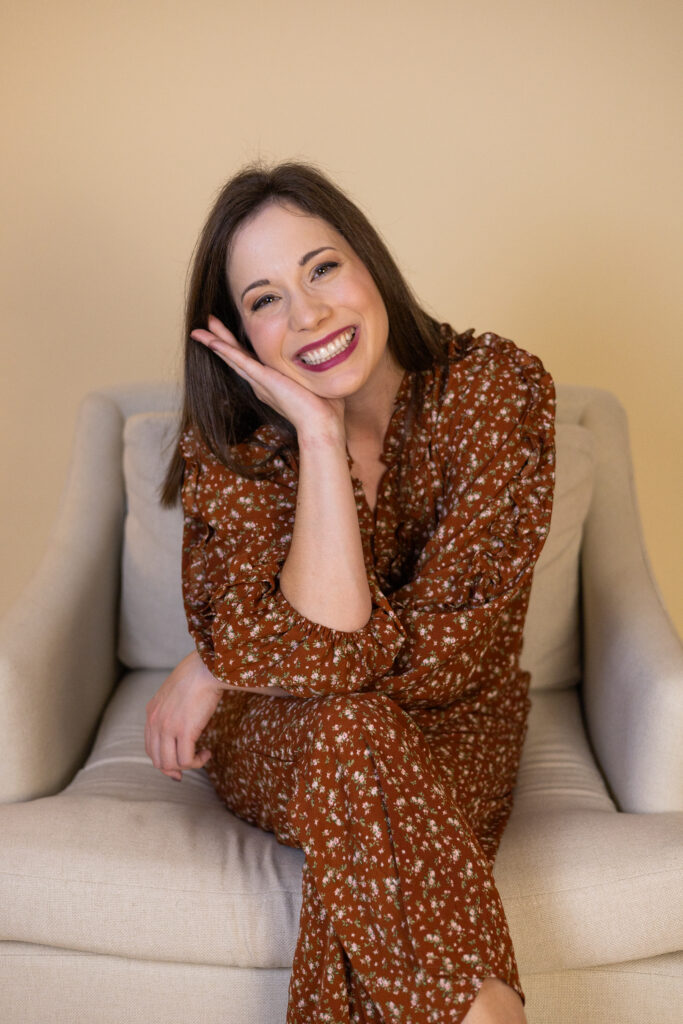
[Image Description: A Caucasian woman (Laura Andert) dressed in a floral jumper, sits in a chair with her legs crossed, arms folded on her lap, and one hand cups Laura’s smiling face.]
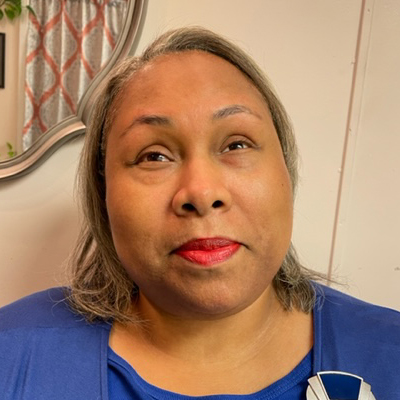
About the Author: Empish Thomas is an Intern Writer with Lights! Camera! Access! (LCA) Newsletter/Marketing Team. She’s been with the disability newsletter brand since 2024. Empish’s hobbies are watching audio-described movies, reading audiobooks, and listening to podcasts.
[Image Description: An African American woman (Empish Thomas) dressed in a dark blouse with shoulder-length hair smiles softly. The woman stands in front of a cream color wall with a mirror behind her.]
